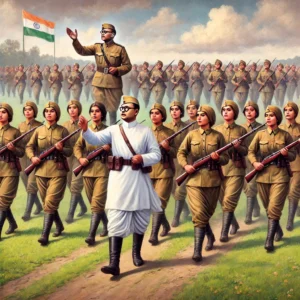
Netaji Subhas Chandra Bose was not just a revolutionary; he was a visionary leader who believed in equality and empowerment. In a time when women were often confined to household roles, Netaji dared to dream of a nation where women stood shoulder to shoulder with men, even on the battlefield. His formation of the Rani of Jhansi Regiment in the Indian National Army (INA) was a bold step that changed the narrative for women in India’s freedom struggle.
Netaji always believed in the strength and potential of women. To him, they were not just symbols of care and compassion but also of courage and resilience. When he formed the INA to fight against British colonial rule, he ensured that women had an equal opportunity to contribute. This belief led to the creation of the Rani of Jhansi Regiment, named after the fearless warrior queen, Rani Lakshmi Bai.
It wasn’t just a symbolic gesture; it was a fully operational combat unit. This was the first women’s regiment in the history of India and one of the very few in the world at that time. Netaji’s decision was revolutionary, and it showed his trust in women as leaders and fighters.
The Rani of Jhansi Regiment attracted brave women from all walks of life, especially Indian expatriates living in Southeast Asia. These women left behind their homes and families to fight for their country’s independence. One of the most notable leaders of the regiment was Captain Lakshmi Sahgal, a doctor who became a fearless commander under Netaji’s guidance.
These women underwent rigorous military training, learning to handle weapons, march in formation, and even survive in hostile conditions. They were prepared for battle, not just as supporting forces but as frontline warriors.
Netaji treated the women of the Rani of Jhansi Regiment with the same respect and responsibility as their male counterparts. He did not see them as “helpers” but as equals in the fight for freedom. His speeches to the regiment were filled with words of encouragement, reminding them of their strength and the importance of their role in building a free India.
One of his most famous quotes was:
“Give me blood, and I will give you freedom.”
This call for sacrifice applied equally to men and women, showing his unwavering belief in collective effort.
For Netaji, the regiment was more than just a group of soldiers. It was a statement to the world that Indian women were capable of greatness. The courage and dedication of these women shattered stereotypes and inspired countless others. They became symbols of empowerment and hope, paving the way for future generations to break barriers.
The Rani of Jhansi Regiment may not have achieved all its military objectives, but its impact was profound. It showed the world that Indian women could fight for their rights and their nation. Even today, their story inspires young girls and women to dream big and never underestimate their strength.
Netaji Subhas Chandra Bose’s decision to form this regiment was not just about fighting the British; it was about changing mindsets. He believed that an independent India could only thrive if everyone, regardless of gender, had the opportunity to contribute.
On Netaji’s birthday, as we remember his incredible contributions to India’s freedom struggle, let us also celebrate his belief in equality and empowerment. The Rani of Jhansi Regiment stands as a testament to his progressive vision and unwavering faith in the strength of women.
Netaji’s leadership teaches us that true progress comes from inclusion and that when given the chance, anyone can rise to greatness. Today, let’s honor his legacy by empowering the women around us, just as he did.
